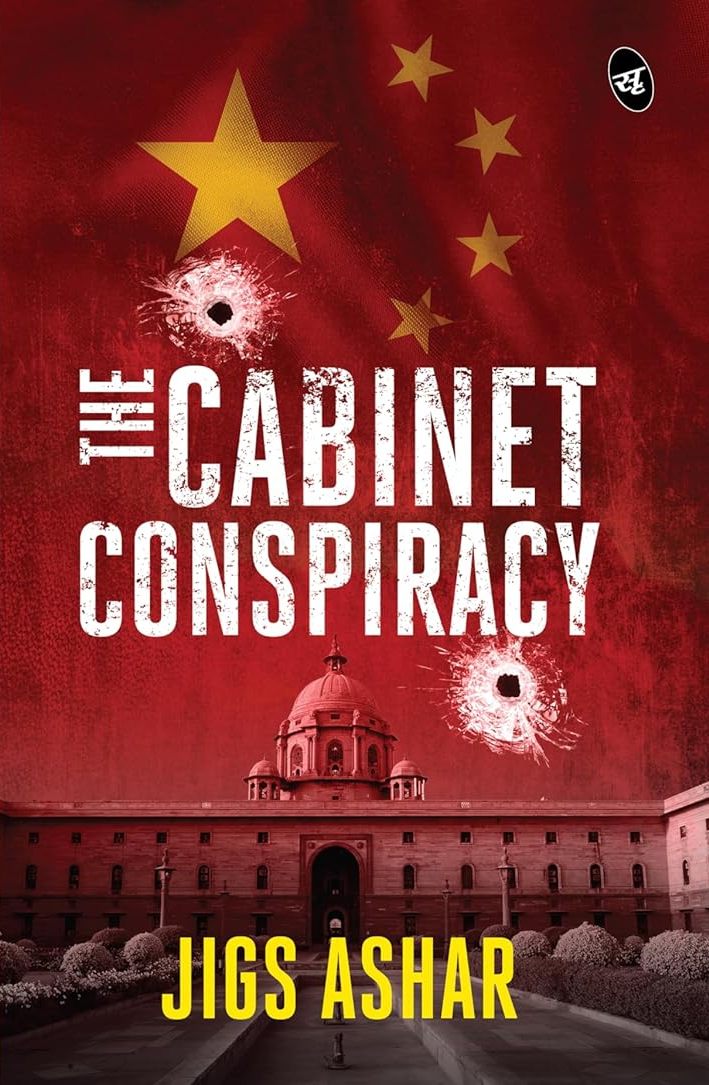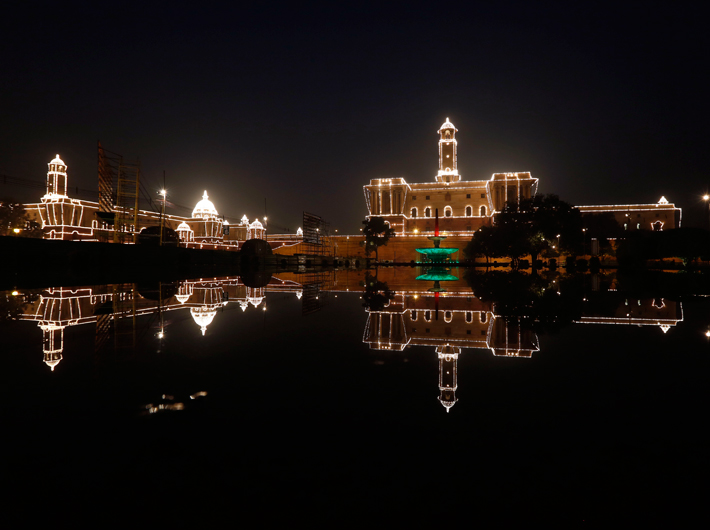Read an excerpt from Jigs Asher’s new novel, ‘The Cabinet Conspiracy’, and decide
The Cabinet Conspiracy
By Jigs Asher
Srishti, 227 pages
 The award-winning author Jigs Ashar is back with another thriller ‘The Cabinet Conspiracy’ (Srishti), an international political espionage set in the corridors of power in India. Master storyteller Jeffrey Archer had adjudged him a winner for the best short story a few years ago. This thrilled promises to provide all the Jeffrey Archer and Frederick Forsyth pace and twists.
The award-winning author Jigs Ashar is back with another thriller ‘The Cabinet Conspiracy’ (Srishti), an international political espionage set in the corridors of power in India. Master storyteller Jeffrey Archer had adjudged him a winner for the best short story a few years ago. This thrilled promises to provide all the Jeffrey Archer and Frederick Forsyth pace and twists.
The author says ‘The Cabinet Conspiracy’ is inspired by real events. It is an edge-of-the-seat thriller about a plot to assassinate the premier of India. The story is set in today, just a few months before the elections and has a rattled co-conspirator in China, whose Belt & Road project has been thwarted. The real events and characters woven expertly into the story blur the lines between facts and fiction.
“Prime Minister Mahendra Doshi” makes a shocking announcement to his cabinet – he will not contest the upcoming elections after completion of two successful terms. Instead, he nominates a surprise PM candidate, which upsets his cabinet, especially “the Serpent”.
Doshi has thwarted China’s ambition to use Indian territory for its Belt & Road Initiative – the only way for China to be a global superpower. In the Serpent, they find a willing insider and a co-conspirator.
While international assassin M inches closer to her target, inspector Anant Kulkarni is given the task to thwart her plans. What Anant does not know is that M has planned a double strike!
‘The Cabinet Conspiracy’ is a suspenseful account of the race against time to foil an assassination plan, and uncovering the identity of the real enemy lurking close by.
Here is an excerpt from the novel, the opening chapters…
Chapter 1
After yet another eighteen-hour day, at around 2 a.m., Mahendra Doshi finally retired to his bedroom. He still found it difficult to believe that it had been a decade since he had first assumed office. Much had been achieved, but much was yet to be done.
Doshi had a long, hot shower – one of the few luxuries he allowed himself to indulge in – and changed into a simple cotton kurta and pajama. At two-three, he looked like a much younger man, thanks to the strict discipline he maintained over his diet.
Whenever possible, which was not often these days, he took a brisk walk in the lawns of his allotted residence. These walks and reading were two things he enjoyed the most; and lately, he could hardly find the time to do either. But that would change very soon, he told himself.
He felt slightly hungry, and was tempted to call for some dal-chawal. But the craving soon passed, after he grabbed an apple and bit into it. He was exhausted and also had an early start the next day; but, as was his habit, he went over to his desk to review his to-do list for the day. It was his routine for over fifty years now, and he could not remember a single day that he had skipped it.
He thought about his illustrious predecessors, feeling both privileged and nostalgic at the same time. Pushing his laptop aside, he opened a brown, leather-bound diary to the first page. While he was a strong advocate for using technology, in some things, he preferred to be old-school. He reviewed each item in the diary and struck off all ten points, feeling satisfied. He then tore the page from the diary, shredded it into little pieces and threw them in a bin underneath the huge desk. The diary had only a few pages left in it now; when all the pages were used up, Doshi would simply replenish it with more sheets of paper instead of ordering a new one. It was his way of signaling to his staff, who, he hoped, would follow suit in more ways than one, and cut down on wasteful expenditure.
For a few moments, Doshi stared at the fresh page in the diary, ready to make his checklist for the following day. But after a few minutes, he sighed and closed the diary. For the first time in his life, he did not need to make one. He thought about the only thing he wanted to accomplish the next day, and nodded to himself. He had made up his mind, but he was worried about the questions that would most certainly arise. He walked over to his bed and lay down, but found himself unable to sleep. For the umpteenth time that day, Doshi went over in his mind how he would handle the situation.
When the alarm went off, as usual, at 5 a.m., Mahendra Doshi, the prime minister of India, was already wide awake, not having slept a wink that night.
Chapter 2
The Serpent buttoned his winter overcoat and put on his hat. The cold air cut through his thick overcoat, freezing up his uncovered face and he wished he had worn an extra layer of clothing. He was amazed at how quickly the temperature had dipped, even though the sun was shining bright.
He looked around him at the vast expanse of desolate wilderness of white steppe, interrupted only by the mountain beyond. The Serpent had always wondered what it would be like to be here. The name of the place, he thought, was apt – Pole of Inaccessibility. As the name implied, it is the point farthest from any sea or ocean in the world – at least 2500 kilometres – in any direction. The Pole of Inaccessibility is located in China, east of its border with Kazakhstan, and is amongst one of the least populated areas of the world. And this is in China – a country with over 1.5 billion people! The Serpent shook his head and smiled at the irony.
He looked at his watch, and realized he had only an hour left until the meeting. A meeting he had called for. He turned around and started to walk back to the car waiting for him. The polished surface of the Audi A8 reflected the final rays of the setting sun. When he was a few metres away, a uniformed chauffeur stood in attention, and held open the rear door for the Serpent, who acknowledged the young Chinese valet.
Right before he got into the car, the Serpent turned around. Just beyond the Pole of Inaccessibility, where the Tian Shan range of mountains branched into two, history was being written, and the Serpent was determined to see himself among those responsible for writing this new chapter in history. He was ready to do whatever it took to see it done.
And for that, the prime minister must die.
[The excerpt reproduced with the permission of the publishers.]
